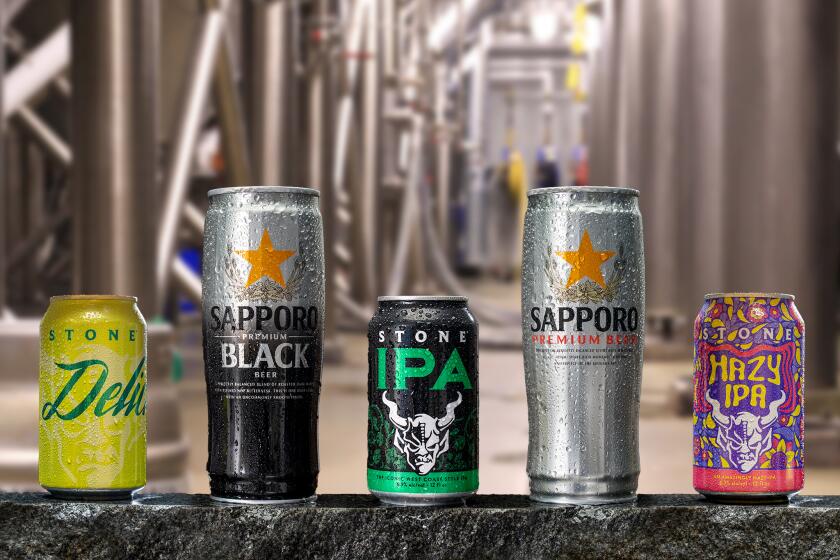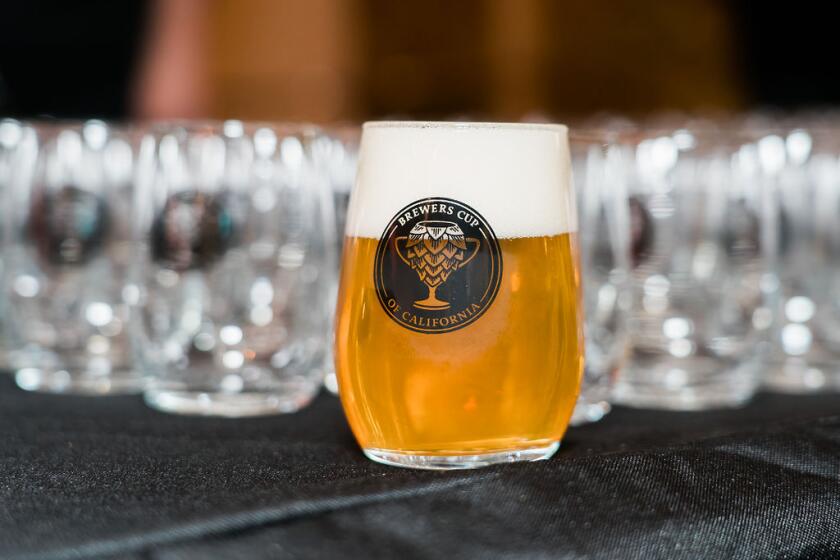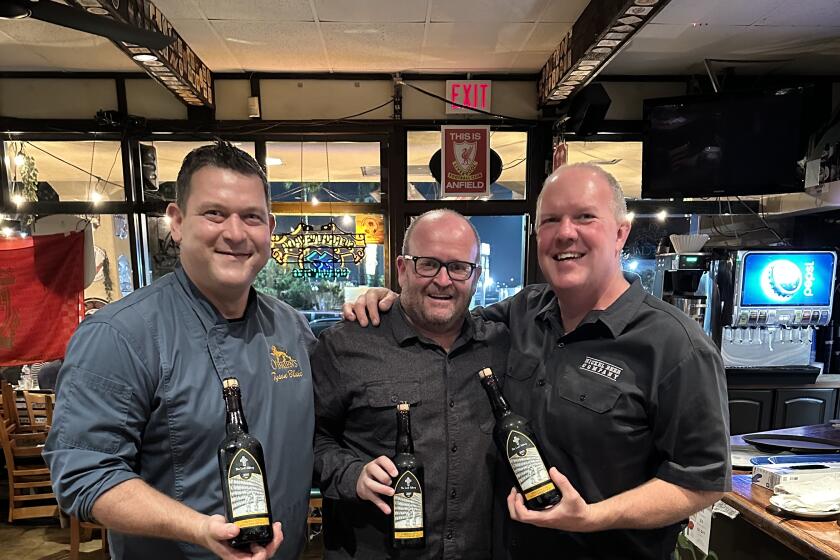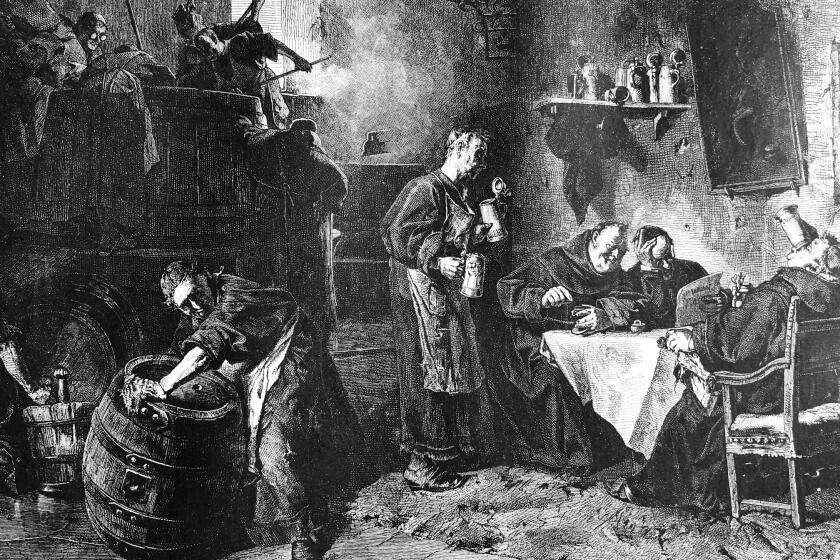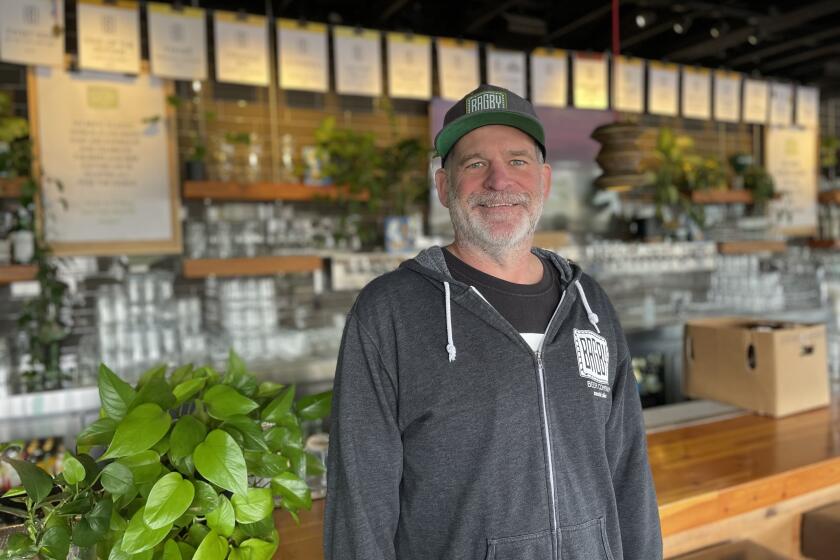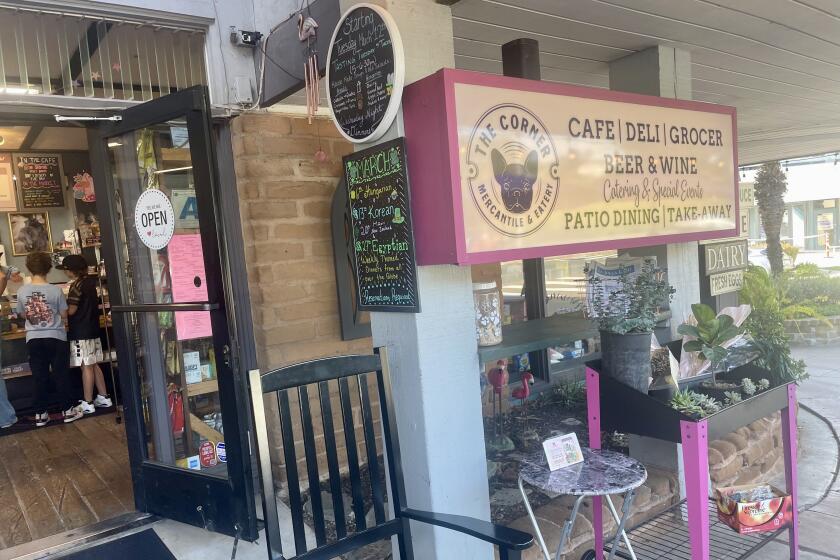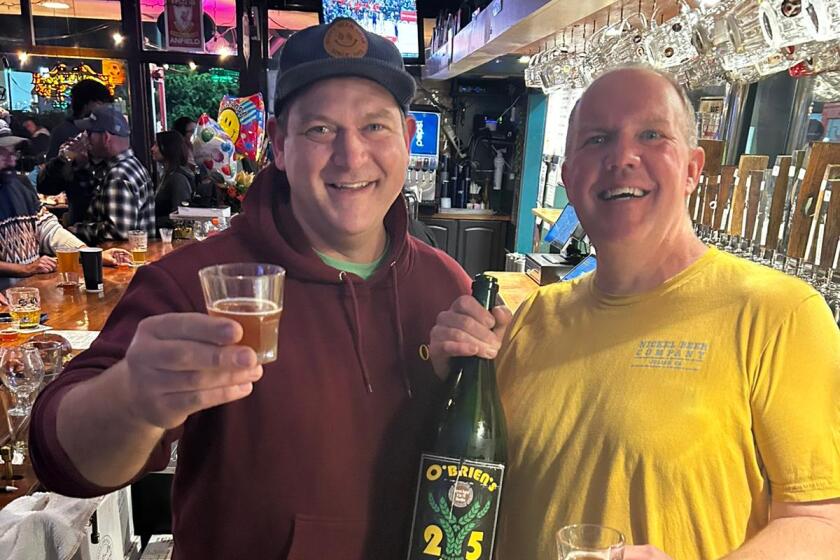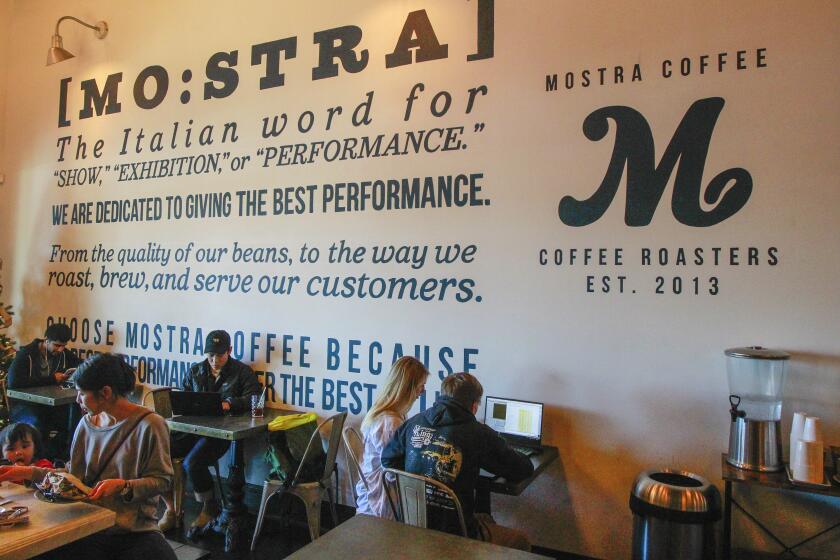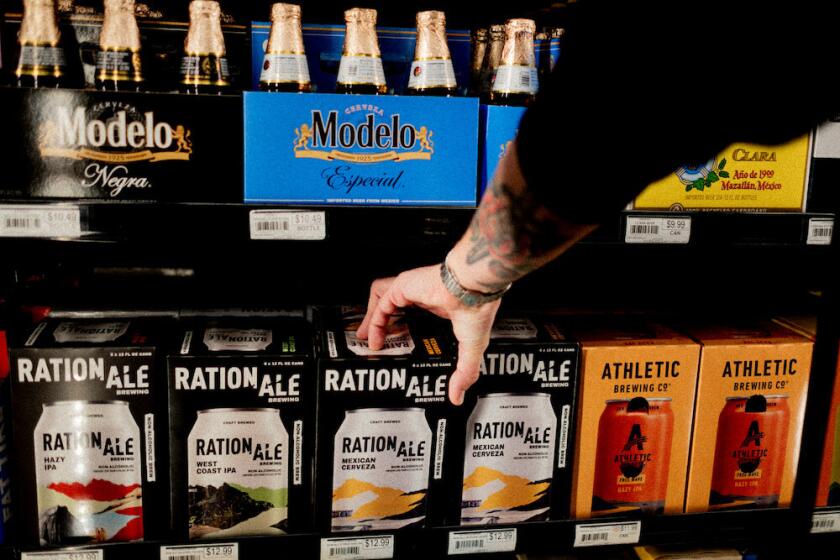Stone v. MillerCoors: The latest battle pitting Big Beer v. craft beer
On a recent hike up Mount Woodson, Galen Baggs spotted another hiker carrying a beer can.
“I didn’t know Stone made a light beer,” he told his wife, Susie Baggs.
It doesn’t. In fact, the well-lubricated hiker was toting a Keystone Light. A 2017 redesign of this MillerCoors brand spells out the beer’s name in large letters — so large, “KEY” is separated from “STONE.”
Stone, whose mascot is a scowling gargoyle, cried foul.
“Stone,” lawyers for the Escondido-based brewery, “and the Gargoyle cannot abide MillerCoors’ efforts to mislead beer drinkers and sully (or steal) what STONE® stands for.”
For years, bad blood has simmered between San Diego’s independent breweries and Big Beer. Just examine the list of participants in the 10th annual San Diego Beer Week, which begins Friday. The 500-plus events involve nearly all of the county’s sudsy enterprises — except the two breweries and one brewpub owned by out-of-town corporations.
“I don’t want to say we are not welcome,” said Ben Shirley, the brewer at Anheuser-Busch’s 10 Barrel brewpub in East Village. “But we are certainly outside the circle.”
Nothing better illustrates these tensions than Stone Brewing Co., LLC v. Molson Coors Brewing Company et al (MillerCoors is a Chicago-based division of the multinational Molson Coors). The case, MillerCoors’ lawyers argue, has nothing to do with trademark infringement and everything to do with Stone’s identity crisis.
“What does a company that was built around its opposition to ‘Big Beer’ do when it becomes ‘Big Beer?’” attorneys for MillerCoors ask in court documents, noting that Stone now operates satellite breweries in Virginia and Germany.
“Stone Brewing’s solution appears to be to file this meritless lawsuit against MillerCoors.”
Bounties
Susie Baggs knew better. Founder and “chief beverage officer” of Chula Vista’s Brown Bag Beverage, she distributes beer from 16 breweries, from Oregon’s pFriem Family Brewers to Miramar’s Division 23. She’s awash in “craft,” or independent breweries that rely on traditional methods and ingredients.
So when her husband wondered about Stone’s light beer, she knew something was wrong.
“My mouth just dropped open,” she said.
She instantly figured out the mistake, being familiar with the lawsuit — and with what she regards as the unsavory, if not illegal, business practices of the world’s largest beer companies. While Stone is San Diego County’s largest brewery, shipping 397,000 barrels of beer in 2017, for every barrel it sold, MillerCoors sold 131.
“With their economy of scale,” Baggs said of MillerCoors, Anheuser-Busch InBev and other large beer corporations, “they can certainly sell like products for a lot cheaper. If you are competing on price, you will never win.”
Craft breweries, arguing that their beers are superior, often command a higher price than traditional American lagers. But Baggs and others say Big Beer distributors sometimes engage in “pay to play” schemes, such as offering bars the “NFL Sunday Ticket” and other premium cable TV packages — if they drop certain craft beers.
“We’ll get a sale and go to deliver it,” Baggs said. “Then the owner will say, ‘No, we can’t have it.’”
That’s an old story, said Greg Koch, who founded Stone with Steve Wagner in 1996. “We did find instances of Big Beer wholesalers who were putting what they called ‘bounties’ on our tap handles — it might have been $100 per tap handle.”
The practice, Koch said, was especially pronounced in 1998 when San Diego hosted the Super Bowl.
“We had bar owners who were very loyal,” he said, “who would say, ‘Look, I love Stone, but I can’t pass up the $500 being slipped to me under the table.’”
In 2017, California’s Department of Alcoholic Beverage Control settled a “pay to play” complaint against Anheuser-Busch wholesalers, fining them $400,000 for violations in Riverside and Orange counties.
Contacted for this story, an Anheuser-Busch representative denied knowledge of any improper trade practices.
“Acting with integrity is one of our core business principles, and we take trade practice compliance very seriously,” reads a statement the brewery issued last week. “We are proud to be a part of the vibrant and diverse San Diego beer community.”
Nonetheless, local brewers insist that “pay for play” continues.
“We definitely run into new places where the entire draft system has been bought by Anheuser-Busch,” said Robert Masterson, brewer and founder of downtown San Diego’s Resident Brewing.
“Or bars are offered X amount of kegs that don’t cost them X amount of money. Or they drop money on the bar.”
Space Dust
Determining which breweries are truly “craft” can be tricky.
In 2011 when Anheuser-Busch bought Chicago’s leading craft brewery, critics insisted Goose Island was no longer “craft.” Instead, it was “faux craft.”
The ensuing spate of buyouts hit San Diego in 2015, when MillerCoors purchased Saint Archer and New York’s Constellation Brands snapped up Ballast Point.
Stone’s Koch likens those breweries to the “Star Trek” characters who are pulled into a soulless, all-consuming entity, the Borg. “You are the Borg,” he said, “you are subsumed by the Borg and now you are just a branding skin.”
Colby Chandler, Ballast Point’s vice president and specialty brewer, disagreed. “We’re still making beer in San Diego and still want to be part of that,” he said. “We’re still all in this together, no matter the politics.”
Yet, Susie Baggs countered, local independents operate at a disadvantage when competing against local corporately acquired breweries. “The difference is now (Ballast Point) is in every Target,” she said. “That feels unfair. That doesn’t feel like craft because now you have access to things that you never had access to as craft.”
Moreover, Baggs added, most consumers are unaware of these acquisitions. They see that their neighborhood bar or supermarket now sells Elysian Space Dust IPA, but don’t realize this Seattle brewery is now owned by Anheuser-Busach.
“A bar can carry quote-unquote ‘craft beer,’ and it looks like craft beer to the average consumer,” she said. “But a real craft beer can’t compete on the price point.”
Another way the line between craft and corporate beer is blurred, Stone insists, is MillerCoors’ redesign of its Keystone cans.
The new look and an associated marketing campaign, Stone’s lawyers argue in documents filed with the U.S. District Court for the Southern District of California, “point unmistakably to a concerted effort by MillerCoors to capitalize on the goodwill and recognition associated with the STONE® mark and brand.”
‘Use it or lose it’
This complaint is in the eye of the beer holder. Stone’s filings include photos of someone holding a Keystone in such a way that all you see is “STONE.” In MillerCoors’ response, photos show the can rolled forward a bit, revealing “KEY STONE.”
In court papers, Stone’s lawyers seem to be channeling the brewery’s in-your-face persona, trolling Molson Coors’ representatives. There are taunting headlines — “Defendant Struggles to Promote its Fizzy Yellow Beer,” “Defendant’s Vacillating Marketing Efforts”.-- and self-congratulatory passages about Stone’s “awesome reputation” and status as “the global standard bearer for independent craft beer.”
Experts say the case may turn on whether MillerCoors can persuade a jury that Keystone was commonly known as “Stone” before Stone Brewing’s birth.
“… if there is any confusion between these two beers, MillerCoors’ rights are superior to Stone Brewings’,” MillerCoors’ legal team argues. “MillerCoors used KEYSTONE, STONE, and STONES to sell Keystone beer prior to Stone Brewing’s first use of STONE.”
In trademark law, the concept of “priority” is critical. “The court will look to see who used the term ‘Stone’ first in the public domain,” said Scott Harper, a Dallas trademark lawyer, “where it would become associated with beer.”
Keystones dates back to 1989, seven years before Stone’s debut. Still, Harper said, MillerCoors would have to demonstrate that it consistently employed those terms.
“It’s use it or lose it,” he said.
Within the MillerCoors filings, there’s a plea to beer fans: Can’t we all just get along?
“In reality,” the lawyers wrote, “there is no actual ‘War’ between these beer companies except in the minds of Stone Brewing’s CEO and marketing staff. People just want to drink beer.”
To Koch, this is the Borg at its most insidious, attempting to create a false sense of security before assimilating its victims.
“We can call them bad or evil, but the truth is that they have no soul,” he said. “It’s really just an unfeeling machine.”
Get U-T Business in your inbox on Mondays
Get ready for your week with the week’s top business stories from San Diego and California, in your inbox Monday mornings.
You may occasionally receive promotional content from the San Diego Union-Tribune.

